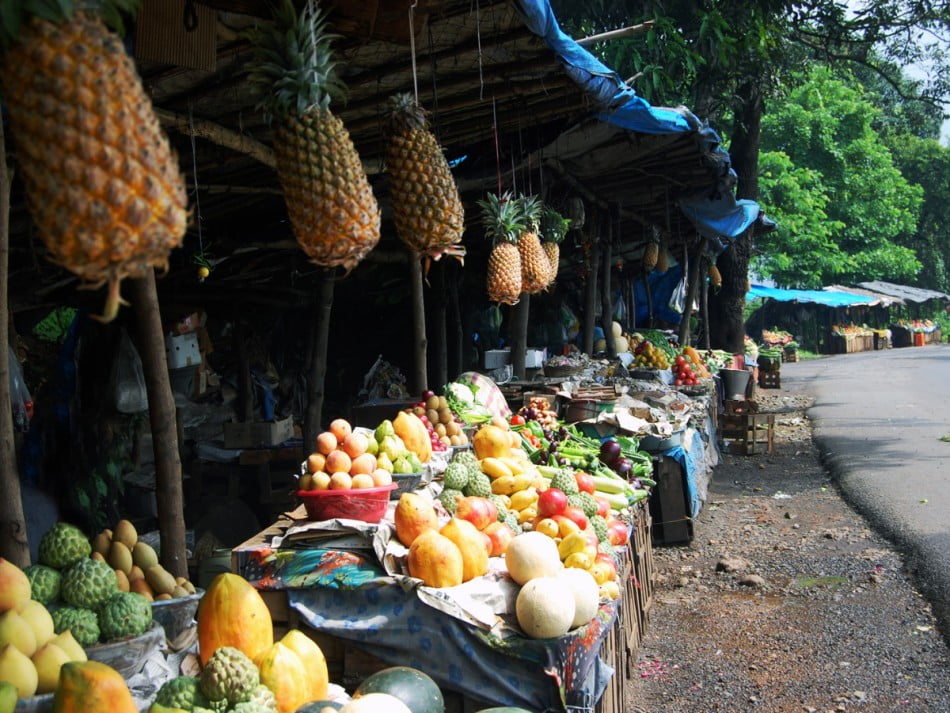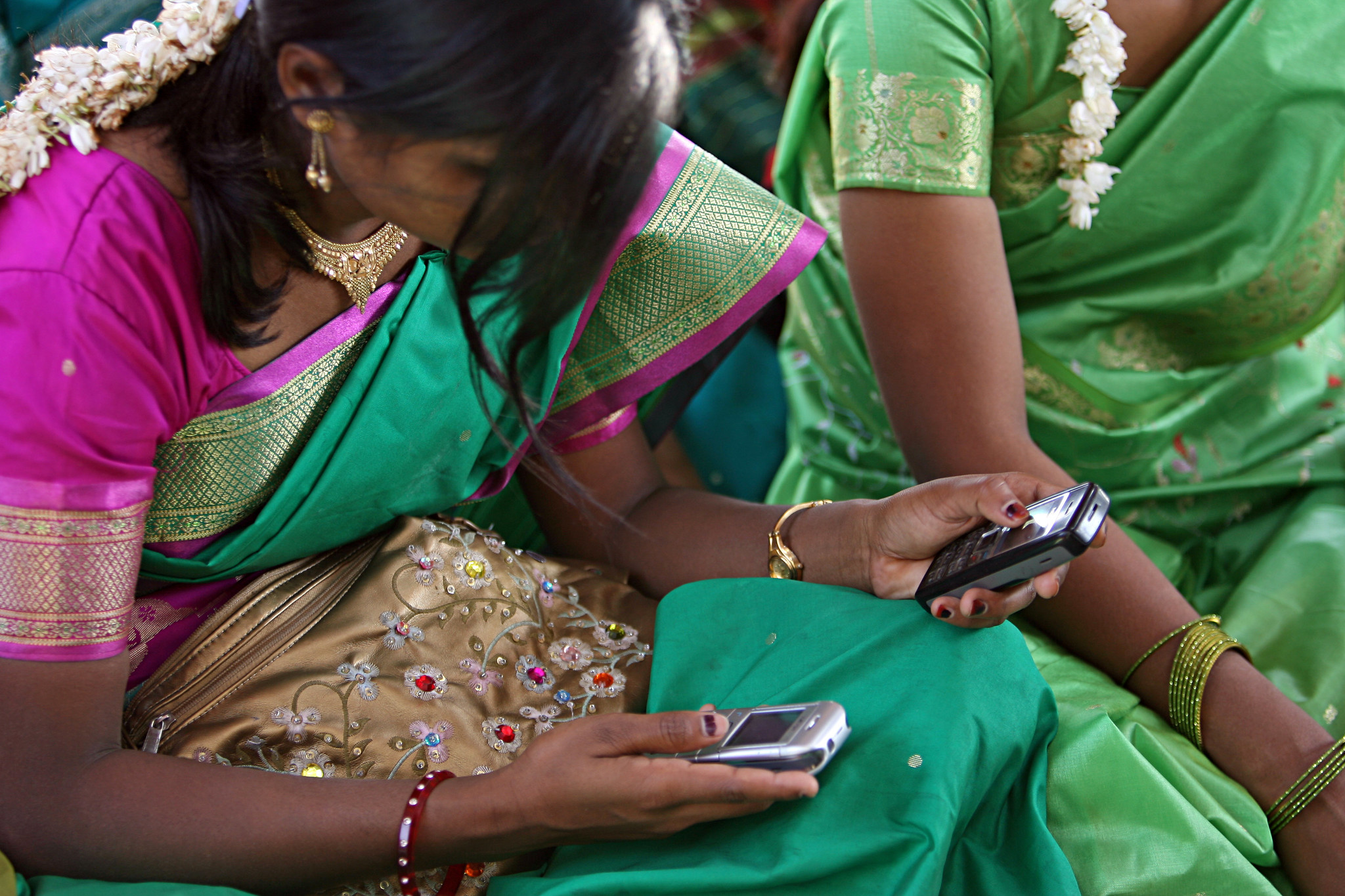Known as one of the most affordable metro cities, Kolkata owes its cheap produce to the East Kolkata wetlands, a swamp area from where most vendors source their fruits and vegetables. In the early hours of the morning, in the bazaars of the city, one would see vendors selling their wares at comparatively cheaper rates and buyers stuffing their shopping bags with fruits, vegetables, meat and fish and a garland of flowers for the morning Puja.
On closer inspection, one would see how gender plays out in these marketplaces, with women, men and children all having their very own roles and interpersonal dynamics.
On closer inspection, one would see how gender plays out in these marketplaces, with women, men and children all having their very own roles and interpersonal dynamics. In the bustling bazaars of Lake Market and Tollygunge, conversations with buyers, sellers and onlookers exposed the gendered space that is the Bengali bazaar.
A floral tradition in the bazaar
Flowers are an inextricable element in the ubiquitous Bengali (Hindu) households where every morning, an offering of fruits, sweet meats and fresh flowers are presented to the gods and goddesses in the in-house altar. The flowers should ideally be plucked from one’s garden, however, the lack of space and the emergence of high rises have made it impossible to forage for fresh flowers. Instead, many households prefer to buy the flowers and garlands from the nearby bazaar.
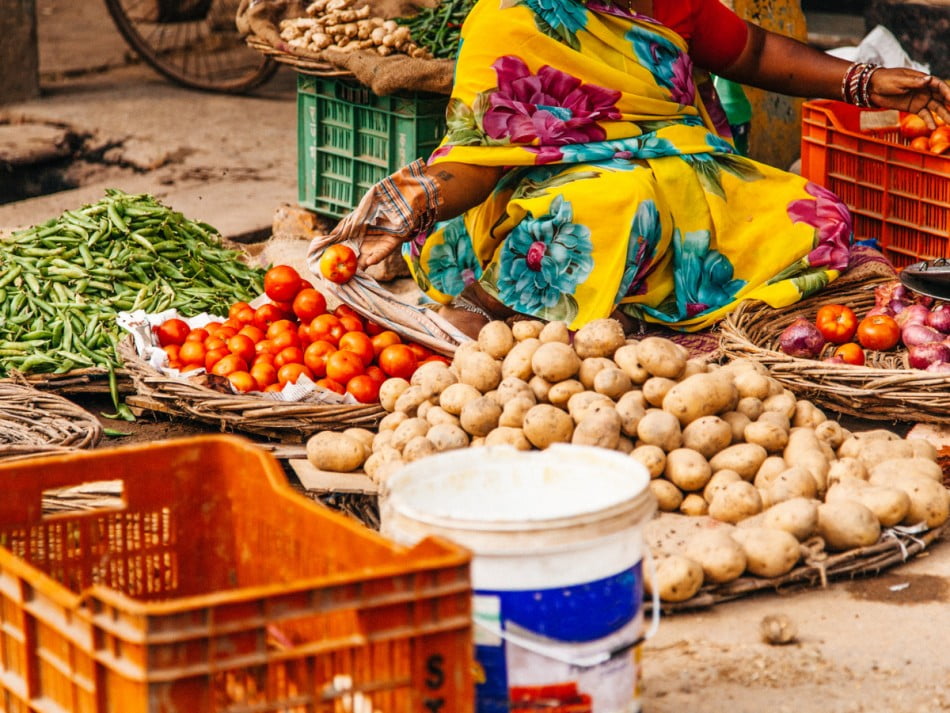
At both Lake Market and Tollygunge Bazaar, the flower sellers who appeared in the marketplace earliest of all, were all women. In Tollygunge Bazaar, vendor Parishkari Mondol addressed why flower sellers were mostly women around here while fruit, vegetables and meat vendors seemed to be mostly men.
‘Flowers have always been associated with women and femininity. Most buyers prefer to buy the puja flowers from women who can handle the delicate buds and petals with utmost care. It takes patience and skill to make garlands and sort flowers,‘ she says.
‘Our buyers are mostly women too‘ says Rupa Naiyya, who comes from Nepalgange every morning to sell flowers in the Tollygunge Bazaar. ‘Women are usually the ones who perform the puja every morning and they prefer to buy their own flowers.’
Since the flower sellers were mostly women, safety during travel was a common concern they shared. The sellers are not local to South Calcutta, they travel in buses and trains everyday from Nepalgange, a locality in the South 24 Parganas district in West Bengal. In order to avoid street harassment, these women prefer to reach the market early and leave by noon, so that they reach home by 7pm in the evening.
‘We prefer to travel in a big group to avoid unwelcome behaviour in public places and transports. Dinkaal to ekdom e bhalo noy. (The times are not good at all)‘ says Rupa.
In order to avoid street harassment, these women prefer to reach the market early and leave by noon, so that they reach home by 7pm in the evening.
On being asked about their chores at home, the flower vendors assure that their daughters and daughters-in-law take care of the going ons of their households while their husbands and sons work in the fields.
‘We do not have to work after going home. My daughters will keep everything ready for us,‘ says Mala Barui, a flower vendor in Lake Market. On being asked if her daughters were married or going to school, she tells us that one of them is married and the younger daughter has dropped out of school to help her mother with household chores.
‘The married daughter manages both her in-laws’ home and my house. My younger daughter is very helpful too. She is learning fast,‘ Mala says with a hint of pride in her eyes. The immense pressure on the elder daughter to handle chores at two homes, and the desperation of the fifteen year old younger daughter who dropped out of school just to help at home affects Mala too.
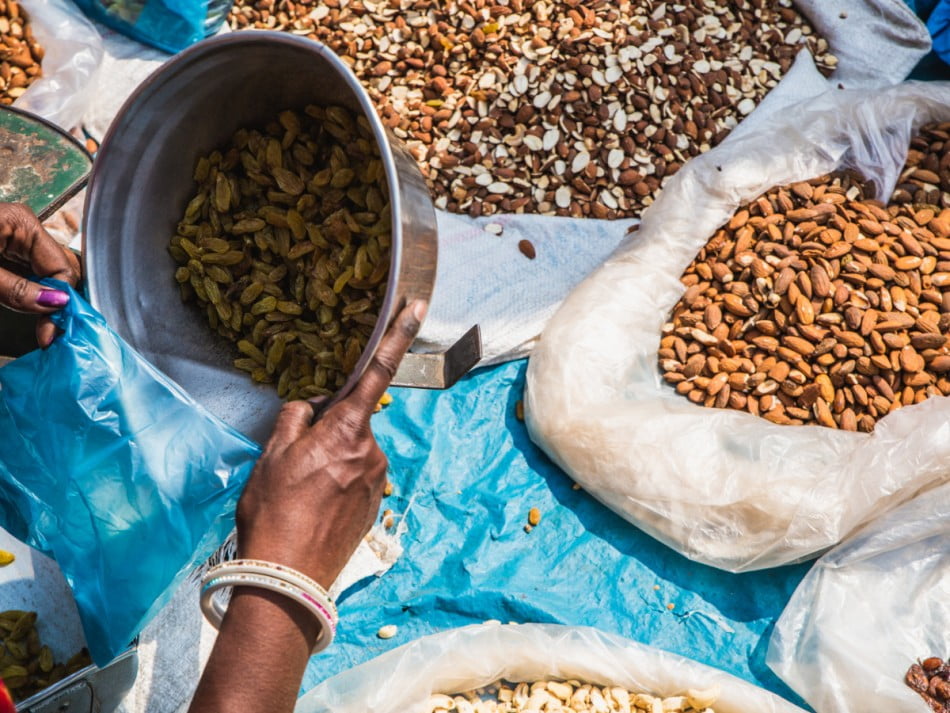
‘I have no sons who can marry a girl who would take care of my home. Hence my daughters got the short end of the stick‘ she remarks. The disinterest of her husband and the men in her family to help with the household is not lost on her.
‘Back in the olden days, women would stay at home while men went out to work. But now due to rising prices, both husband and wife have to work. But only the wife has to work both outside and in the house‘ she says.
Climate change and its impacts
As one moves further within the market, they encounter the grains, vegetable and fruits vendors. The produce today is fresh and vibrant, however that is not the case every day. The recent destructive heatwave had killed potential harvest for a while. According to the Indian Council for Agricultural Research (ICAR), average maximum temperature of more than 30°C during the grain filling stage of the wheat crop adversely affects plant growth and for every 1-degree rise in temperature above this, there is a 3-4% drop in wheat yield. This year, the heatwave caused huge price hikes for vegetables and fruits. Average retail prices were up 9.4% for cereals, 13.5% for pulses and 45.1% for vegetables. On a weekly basis, vegetable prices were up 9.7% in mid-June, the analysts of Emkay Global Financial Services estimated.
‘The stalled rainfall across majority of the country has led to a delay in Kharif sowing and a significant delay will impact food output and the Rabi sowing season, as farmers will have less time to prepare their fields after the Kharif harvest,’ said the report by Emkay Global Financial Services.
While yearly heat waves wreak havoc on food production, heavy rains only provide temporary respite. ‘Due to a late monsoon and shortage of water, pre-transplant activities like raising nurseries, tilling the field and mixing cow manure was also delayed. Fields in elevated areas depend on rainwater while the lower plains do not require much water‘ a farmer from Karnataka told The Indian Express.
This year, the heatwave caused huge price hikes for vegetables and fruits. Average retail prices were up 9.4% for cereals, 13.5% for pulses and 45.1% for vegetables.
The vendors of Tollygunge Bazaar echoed the sentiments of the farmers. ‘The farms we source from are incurring major crop losses. The harvest process is delayed and at times, due to lack of produce and resources, we have to eat into our savings‘, says Pushpa Sau, a vegetable vendor who sells produce alongside her husband in Tollygunge Bazaar.
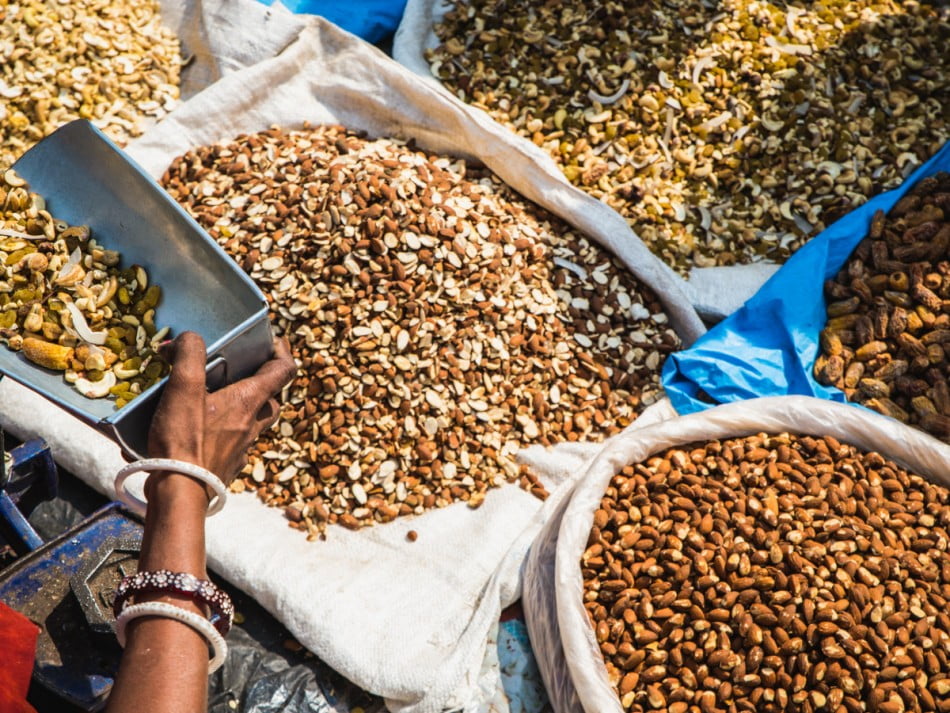
Climate change also affects women disproportionately. As we walk through Tollygunge Bazaar, we hear narratives of how during long summer days, women sellers find it difficult to sell the produce, while on their period. It becomes all the more difficult for them, especially when they have cramps and pains exacerbated by the heat and bad weather.
As we walk through Tollygunge Bazaar, we hear narratives of how during long summer days, women sellers find it difficult to sell the produce, while on their period.
‘There is no public toilet for us. Men can relieve themselves anywhere but women, especially when on their period, need access to washroom spaces‘ says Pratibha Barik, a vegetable vendor in Tollygunge Bazaar.
Fear of gendered violence and safety concerns for women vendors in Kolkata’s bazaars
While exploring the bazaars, it was seen that the produce vendors who are not local to Kolkata and travel from the outskirts via train or bus are mostly male or married couples. Rarely, were there single non-local women selling fruits and vegetables alone in the market, unaccompanied by a male relative, unlike the flower sellers who come in the morning.
On being asked about this, Padmarani Mondol and her husband Shambhu who sell produce near Lake Market, cite safety concerns for women.
‘You can sell flowers in the morning and leave by noon in a group. People require flowers for the morning Puja. But vegetables and fruits might be required anytime during the day. So we have to stay in the bazaar till late. When it is dark, it becomes difficult for us women to go back home alone.‘ Padmarani says. She comes with her husband from Lakshmikantapur in Canning by train. It usually takes more than 2 hours for them to reach the market.
Lack of awareness of schemes and incentives
Under the PM SVANidhi scheme, Urban street vendors will be eligible to avail a Working Capital (WC) loan of up to Rs 10,000 with tenure of 1 year and repaid in monthly instalments. For this loan, no collateral will be taken by the lending institutions. For women vendors, the Udyogini Yojana has been implemented by Women Development Corporation under the Government of India. This scheme promotes and motivates women’s entrepreneurship among the poor by providing financial support to women for doing business.
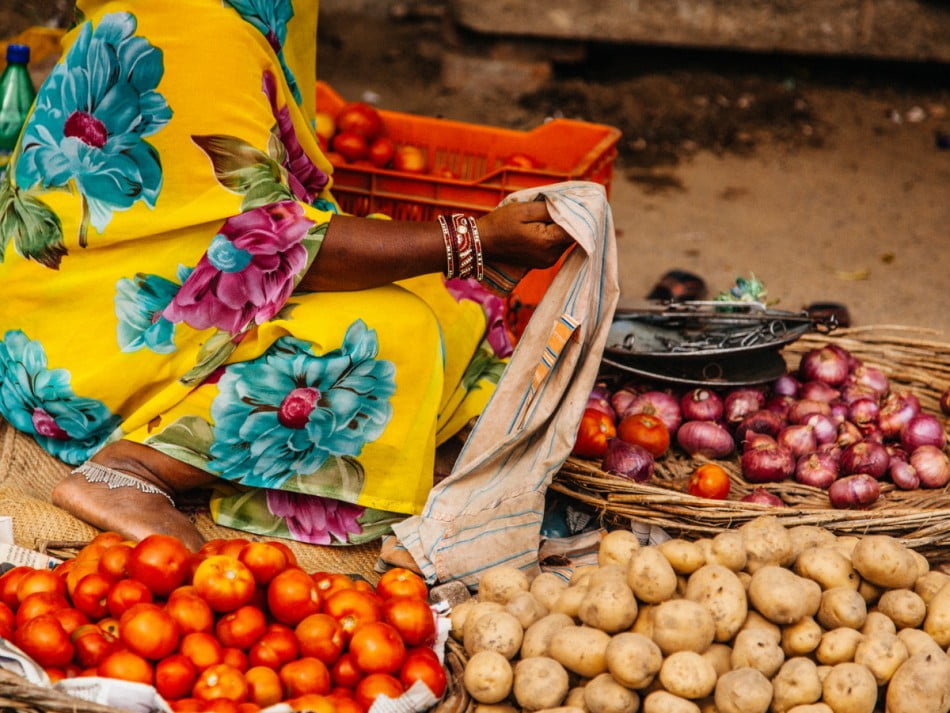
While these loans and schemes are a welcome step for the financial safety and livelihoods of vendors, many are not aware of such incentives.
‘I thought women were only entitled to Rs 500/1000 a month for Lakshmi Bhandar. We are never told about subsidised loans and schemes which can actually help our livelihoods instead of these freebies which are not useful at all‘, says Parul, a vendor who sells vegetables in Lake Market.
The lack of awareness and education about helpful incentives causes these women and their families to resort to loans from money lenders and middlemen who levy hiked interest rates and therefore, they end up losing their profits and savings. These women rarely have the means to form collectives and unions in the urban marketplaces of Kolkata.
‘We need a platform to address our concerns. From the lack of knowledge provided about incentives to our battles with climate change and gendered issues, we have a lot to say,’ says Parul.
The urban marketplace is a space rife with gendered roles, dynamics and activities. It is safe to say that such a nuanced and diverse space deserves further exploration to understand how social factors like gender, caste, religion and class play out in the bazaar.
About the author(s)
Ananya Ray has completed her Masters in English from Jadavpur University, Kolkata, India. A published poet, intersectional activist and academic author, she has a keen interest in gender, politics and Postcolonialism.
